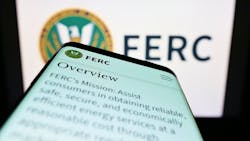[UPDATED: to reflect correct confirmation date]
The US Senate confirmed two Republicans as commissioners of the US Federal Energy Regulatory Commission (FERC) Oct. 7, restoring the commission to its full complement of five, with three Republicans and two Democrats.
President Trump nominated Laura Swett to a term that expires June 30, 2030, and David LeCerte to a term that expires June 30, 2026.
Swett took over the term of Mark Christie, who served as FERC chairman for most of the first 6 months of the year before being replaced by Democrat David Rosner. LeCerte replaces Democrat Willie Phillips, who served as chairman during the Biden administration. Trump asked both Christie, a Republican, and Phillips, a Democrat, to resign.
While Swett and LeCerte were nominated and confirmed as commissioners, one is likely to assume the position of FERC chairman, replacing Rosner.
Republican Commissioner Lindsay See and Democrat Judy Cheng round out the panel that evaluates interstate natural gas pipelines, the reliability of the power grid and LNG projects.
The Interstate Natural Gas Association of America (INGAA), a trade association representing gas pipelines, congratulated Commissioners Swett and LaCerte on their new roles.
“INGAA has long said that FERC works best when it has a full complement of 5 commissioners to provide the regulatory certainty necessary for investment in America’s energy infrastructure,” INGAA said in a press statement.
Meanwhile, FERC on Oct. 1 issued two orders to insert sunsetting provisions in 53 regulations that it described as “outdated and unnecessary.” The move comes in response to an executive order issued by Pres. Trump this spring directing agencies to consider which of their regulations could be revoked.
“While there had been speculation that the list of regulations could be broader, with far-reaching implications and uncertainty to the industry, the final list addresses primarily administrative matters,” law firm Crowell and Moring LLC said in a client note.
The firm said FERC targeted “clearly outdated regulations and administrative requirements that are no longer relevant.” For example, applicants would no longer need to provide forms of notice, including floppy disks and paper copies of filings.
About the Author
Cathy Landry
Washington Correspondent
Cathy Landry has worked over 20 years as a journalist, including 17 years as an energy reporter with Platts News Service (now S&P Global) in Washington and London.
She has served as a wire-service reporter, general news and sports reporter for local newspapers and a feature writer for association and company publications.
Cathy has deep public policy experience, having worked 15 years in Washington energy circles.
She earned a master’s degree in government from The Johns Hopkins University and studied newspaper journalism and psychology at Syracuse University.
